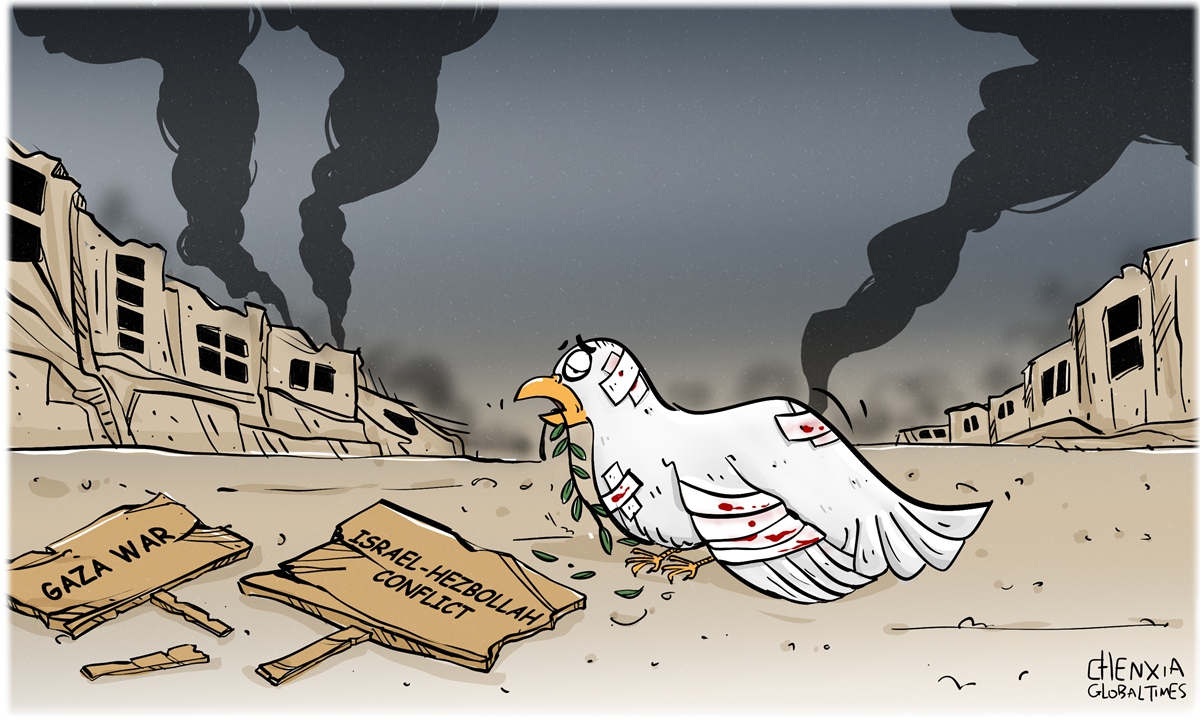
Destroying peace. Illustration: Chen Xia/GT
On Monday, Israel launched another round of airstrikes at Lebanese armed group Hezbollah, killing more than 500 people in Lebanon's deadliest day for decades. Clearly, the conflict between Israel and Hezbollah has intensified.
At the moment, the international community hopes that the situation between Israel and Lebanon will not escalate further.
On September 20, regarding the latest explosions of pagers and handheld radios across Lebanon, China's Permanent Representative to the UN Ambassador Fu Cong at the UN Security Council Briefing on the Lebanese-Israeli Situation said that China registers profound shock and grave concerns over this development and called on the parties to exercise maximum restraint. China called on Israel, in particular, to forego its obsession with the use of force and to halt without delay its military operations in Gaza, its violations of Lebanon's sovereignty and security and its adventurism that risks dragging the region into yet another devastating catastrophe.
The current situation between Israel and Lebanon is worrying mainly for two reasons. First, Israel has intensified its comprehensive attack on the Lebanese armed group in the past few weeks, causing the group's strong hostility to Israel. In this context, it will inevitably look for opportunities to retaliate against Israel. Hezbollah has stated that it will launch an "open-ended battle of reckoning" against Israel, and large-scale attacks against Israel appear to be inevitable.
Second, Israel's larger military operation against Hezbollah is imminent. Over the past two months, Israel has completed political preparations and public opinion mobilization for military operations against Hezbollah, and several elite Israeli main forces have been transferred from the Gaza Strip to the northern front line, preparing for a large-scale attack against Lebanon. For Israel, the upcoming comprehensive military operation against Hezbollah aims to eliminate the "threat" from the armed group.
If the conflict between Israel and Hezbollah escalates, it will have a greater impact on the security structure of the Middle East. Israel's military operations against the Lebanese armed group are likely to go deep into southern Lebanon, with the aim of clearing out Hezbollah strongholds south of the Litani River in Lebanon. Since Hezbollah has been operating in the area south of the Litani River for many years and has established a relatively strong military network, the Israeli army's attack is likely to bring greater casualties. In the successive wars in which the Israeli army invaded Lebanon in 1982, 1996 and 2006, it brought a major humanitarian crisis to southern Lebanon. A large number of people in southern Lebanon had to flee their homes and flock to the capital Beirut or other northern and central cities.
More importantly, compared to Hamas in the Gaza Strip, Hezbollah has greater regional influence. It not only has closer ties with Iran, but it also has stronger ties with the Houthi armed forces in Yemen and the Shia militias in Iraq. Therefore, if a war breaks out between Hezbollah and Israel, especially when Israel may launch a large-scale ground attack on Hezbollah, Israel will face more intense military confrontations with Yemen's Houthi armed forces, Iraqi Shia militia and other organizations.
The conflict lacks a suitable mediator. Regional countries that are mediating the conflict in the Gaza conflict, such as Qatar and Egypt, are unwilling to enter into dialogue with Hezbollah, which has Shia doctrine as its political background. Most of the current mediation attempts by the international community are through engaging with the Lebanese government. However, the Lebanese government is unable to govern the Hezbollah-controlled areas in southern Lebanon. Hezbollah holds controls of parts of Lebanon and has its own military branch, and once a large-scale conflict breaks out, it probably cannot be handled through conventional diplomatic mediation.
The main reason why the recent conflict between Israel and Hezbollah has escalated rapidly in a short period of time is Israel's aggressive attack posture. Only if both parties to the conflict, especially Israel, take a more restrained attitude, can tensions be eased.
At the same time, the international community and regional countries should start to establish mediation plans and humanitarian relief plans for conflict response. They must also work together to deal with possible risks of conflict escalation and proliferation.
The author is director of the Israeli Studies Program and Center at Northwestern University in Xi'an. opinion@globaltimes.com.cn




